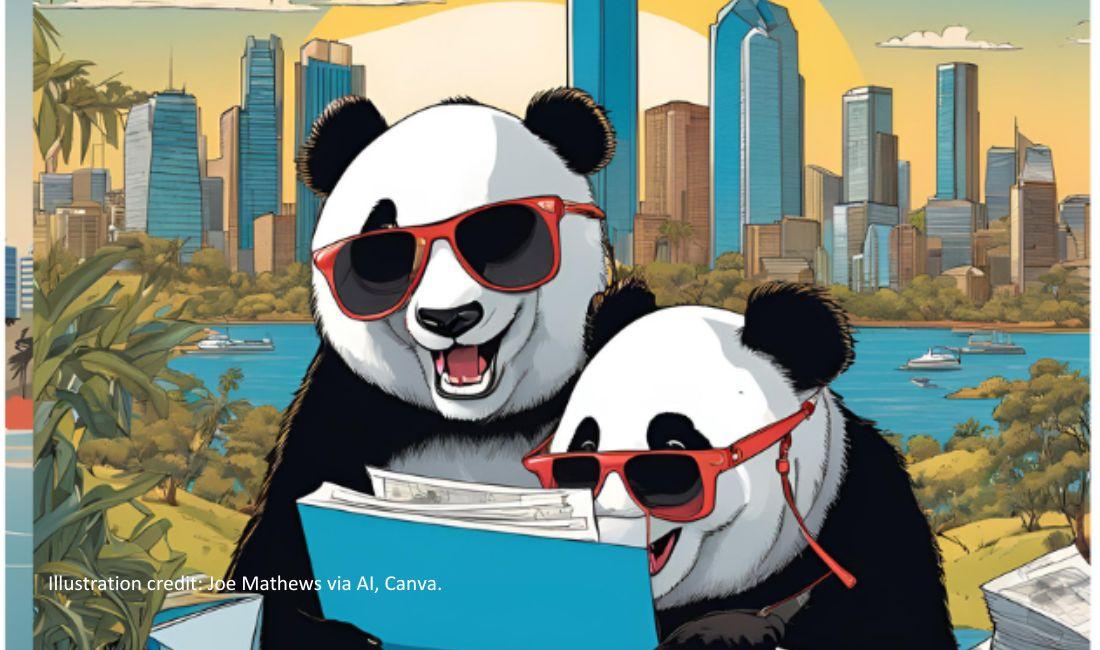The San Diego Zoo's new giant pandas suggest that non-citizens and non-humans should have democratic rights.
This column was edited by and co-published with Zócalo Public Square. Illustration credit: Joe Mathews via AI, Canva.
By YUN CHUAN AND XIN BAO
Nǐ hǎo, jiāzhōu!
Hello, California!
We are the Golden State’s two giant pandas, the first to enter the United States in two decades. And while it’s only been a few months since we departed southwest China for the San Diego Zoo, we’ve already met the governor, celebrities, TV broadcasters who love puns (“Panda-monium”), and thousands of everyday people, some of whom pay $115 to enter the zoo in the early morning and walk around with us for an hour.
We now feel so at home in California that we’re wondering how we might take on the responsibilities of citizenship. For example, we hear so many of the people visiting us talking about your November elections.
So, why don’t you let us vote in them, too?
In asking this, we want to reassure you that we are reluctant to get political. Why take sides when we’re more popular than the Padres? (We never strike out, and we’re cuter than Jackson Merrill) The two of us are laidback types; zookeepers describe Yun, a 5-year-old male, as “mild-mannered, gentle and lovable,” and Xin, a 4-year-old female, as a “gentle and witty introvert with a sweet round face and big ears.”
And like so many of our fellow Californians, we ignore the news. We prefer to spend our time sunbathing, sleeping, and consuming as much grass as we can get our paws on. To clarify, our grass of choice is bamboo—the zoo grows eight species of it because we are picky.
We also must walk a fine line as “envoys of friendship,” in the words of the Chinese government, which loans us out to overseas zoos for $1 million a year. That means we and our fellow panda migrants—including old Sichuan friends who will soon head to the National Zoo in D.C. and perhaps the San Francisco Zoo—are really diplomats. And we represent a difficult client state that bullies its neighbors and inspires retaliatory tariffs and hateful rhetoric from a former-and-perhaps-future American president whose team uses the term “panda hugger” as a pejorative. (Pro tip: even if you love China, it’s best not to hug us—we are real animals, not stuffed bears.)
There are other reasons we might be wise to stay out of the political arena. For one thing, we are non-humans now living in a country that ranks low in the global Animal Protection Index. For another, we are newcomers to an America so deeply infected by xenophobia that a majority of voters support mass deportation of immigrants and their families. (Before JD Vance starts spreading lies about what we eat, let’s be clear—we are herbivores.)
Yet, despite all the ways in which we count as outsiders, we pandas, by our very presence, offer Americans a chance to understand your real challenges.
Try looking at things from our perspective. After all, we, like you, are a vulnerable species trying to survive on an increasingly inhospitable planet (there are fewer than 3,000 giant pandas in the world).
We are also living proof that—in this age of moral relativism and lie-based politics—some very important things remain black and white.
Like the fact that true democracy requires the representation and participation of all living things.
Including us.
Sure, your human media are full of phony accusations that foreigners are voting in this year’s elections. They aren’t, but why shouldn’t they be able to? It’s increasingly common around the world for jurisdictions to open up local elections to non-citizens. San Francisco has done so for school board contests, for instance.
If we could vote in San Diego elections, we might cast a ballot for anyone who could stop the constant noise of jets flying low over us here in Balboa Park, as they prepare to land at the airport. Our participation also might raise the question of why we live rent-free in the expanded Panda Ridge complex while the city tears down encampments of the unhoused and allows the loss of hundreds of shelter beds.
Your national constitution has no prohibition against non-citizens voting—states, like yours decide. Unfortunately, California, while claiming to be a democracy defender, has decided to disenfranchise one-in-six of its adults based on citizenship, even though such people pay taxes, abide by the laws, serve in the military, and raise children who are citizens. California could enfranchise six million people by letting non-citizen residents vote.
It also could bring people together across national boundaries, and create a framework for global political solutions, if it reached agreements of “reciprocal voting” to allow Californians and residents of other states and countries to vote in each other’s elections.
Such a reciprocal system would demonstrate human interdependence. But interdependence on this planet encompasses all living things. Humans are less than 1% of the world’s biomass but have 100% of the world’s democratic rights. Plants are more than 80% of the biomass and unrepresented, even though humans couldn’t live without them.
Providing representation to us animals and plants is not a new idea. There are efforts around the world to imagine democratic systems for various beings, including the Multispecies Constitution Project at the L.A.-based Berggruen Institute, where this column’s usual author is a fellow.
That project asks questions like: “What sorts of institutions could speak with—rather than for—the trees, the birds, the microbes, and the diverse humans of this planet?” The idea is that by incorporating the intelligence, experiences, values, and interests of other living things into governance, you humans will save ecosystems—and maybe yourselves. Intriguingly, some non-human creatures, like whales, are beginning to converse with you.
If the two of us could talk with you directly, instead of through the imagination of a human journalist, we might chat about the struggles of starting a family in California. We are a couple facing expectations to breed. And yes, San Diego is a great place to mate, and not just for all the sun-kissed humans in the beach-themed bars.
In fact, Yun’s grandparents lived at the zoo in the 2000s and had five cubs here, including his mother Zhen Zhen. It seems unlikely that we’ll be that fertile. And we can’t know how long we’ll get to stay here, given the conflict between our birth country and our new home country.
But for now, we are Californians. Shouldn’t we have the same rights and responsibilities as all of you?




